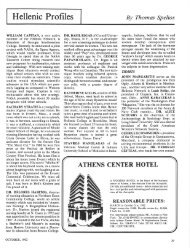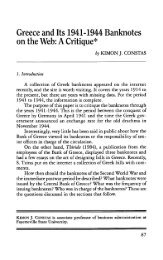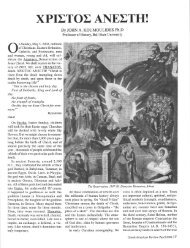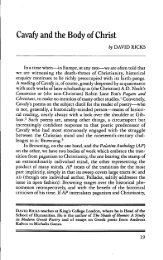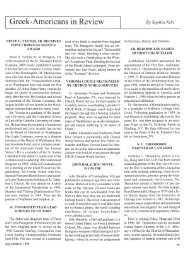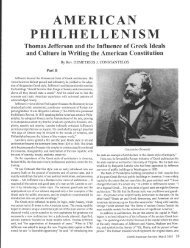The History Man
The History Man
The History Man
You also want an ePaper? Increase the reach of your titles
YUMPU automatically turns print PDFs into web optimized ePapers that Google loves.
24 JOURNAL OF THE HELLENIC DIASPORA<br />
as a whole within a generalized model which fails to account fully for all<br />
its features. Correspondingly, the poems in which Cavafy either uses<br />
history explicitly as an allegory or "alibi" for the present, or enters the<br />
world of myth and legend in which history most readily repeats itself,<br />
are very few. And all of them were written before the "watershed" year<br />
of 1911.<br />
<strong>The</strong>re are altogether twelve poems in which Cavafy presents or refers<br />
to the past more or less explicitly as a moral allegory for the present.'<br />
<strong>The</strong> opening lines of "<strong>The</strong>rmopylae," in the Keeley and Sherrard translation,<br />
aptly demonstrate this (1901/1903: A103, tr. 12) 2 :<br />
Honor to those who in the life they lead<br />
define and guard a <strong>The</strong>rmopylae. (my emphasis)<br />
Not the historical pass defended and lost in 480 B.C., but any crucial<br />
moral "pass." A <strong>The</strong>rmopylae is a historical metaphor for a contemporary<br />
and generalized dilemma, the purpose of the appeal to history is to illustrate<br />
a perennial, and especially a present, moral truth. Similarly, in others<br />
of these poems: "our efforts . . . are like the Trojans' " (A26, tr. 17);<br />
the soul is to watch out for "some Artemidoros" giving warning (A18,<br />
tr. 24); <strong>The</strong>odotos, bearing Pompey's head on a bloodstained platter, may<br />
even now be entering the house of some neighbor (A21, tr. 40); at the<br />
end of the Odyssean voyage, "you" will have learned "what Ithacas mean"<br />
(A23, tr. 29). <strong>The</strong> distinguishing features of these poems are the use of<br />
the present tense or imperative mood, and a first or second person where<br />
the speaker and/or addressee is not specifically included in the historical<br />
context of the poem. Thus in "<strong>The</strong> Satrapy" (A16, tr. 23), the absence<br />
of a consistent context for the person addressed forces it on the reader's<br />
attention that he is "not necessarily <strong>The</strong>mistocles or Demaratos or any<br />
other political figure" (Lechonitis, 1977: 23), and so allows the historical<br />
references that are in the poem (Sousa, the Demos, and the Sophists) to<br />
be taken metaphorically. "You" in the poem, in other words, is as likely<br />
to stand for Cavafy himself, or the reader, as for <strong>The</strong>mistocles or Demaratos,<br />
or even, pace Dallas (1974: 56-63), Alcibiades.<br />
'"Ithaca" (1894?/1910/1911: A23, tr. 29); "Waiting for the Barbarians"<br />
(1898/1904: A107, tr. 14); "<strong>The</strong> Intervention of the Gods" (1899: Anekdota,<br />
111); "<strong>The</strong> Sea Battle" (1899: Anekdota, 121); "Trojan?' (1900/1905: A26, tr.<br />
17); "Interruption" (1900/1901: A102, tr. 11); "<strong>The</strong>rmopylae" (1901/1903:<br />
A103, tr. 12); "<strong>Man</strong>uel Comnenos" (1905/1911: A47, tr. 46); "<strong>The</strong> Satrapy"<br />
(1905/1910: A16, tr. 23); "<strong>The</strong> Ides Of March" (1906/1910: A18, (?/1911:<br />
"<strong>The</strong> God Abandons Antony" (1910/1911: A20, tr. 27); "<strong>The</strong>odotos" 19<br />
A21, tr. 40).<br />
2A11 references to Cavafy's poems in this artide give the date of composition<br />
first (where known) and then the date of publication. Thus, "<strong>The</strong>rmopylae" was<br />
written in 1901 and published in 1903. Where three dates are given, the middle<br />
date indicates a revision. Unless otherwise indicated, all translations in this article<br />
are my own.



